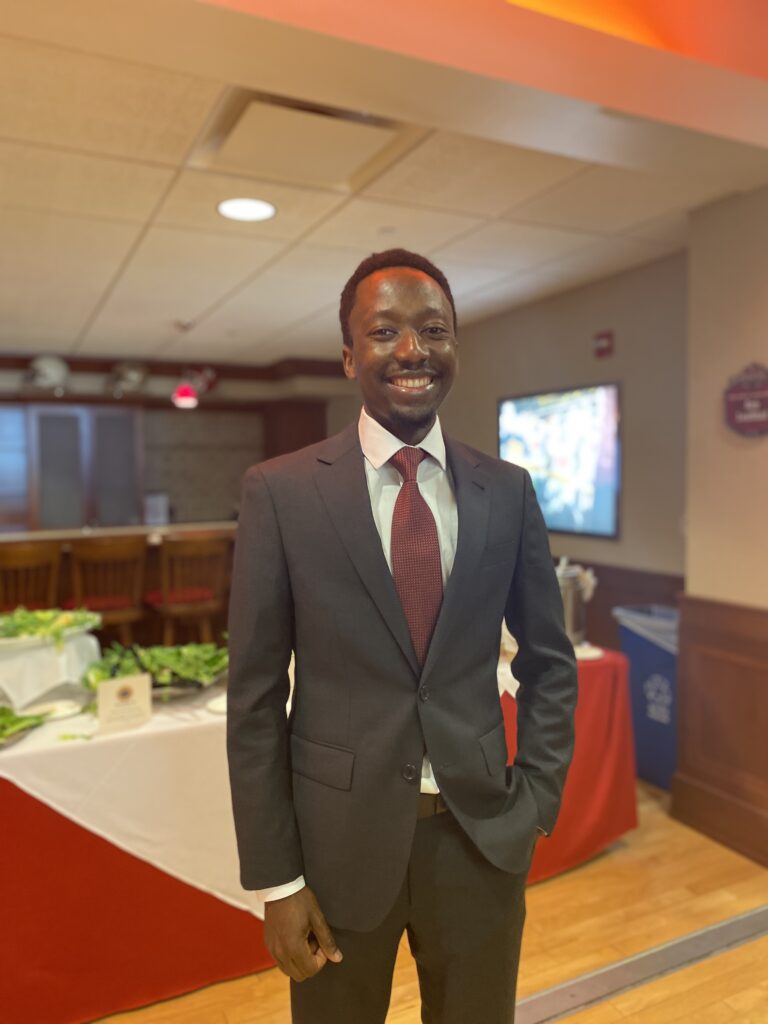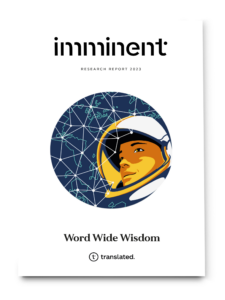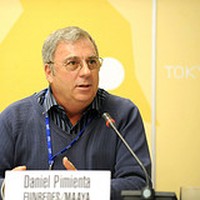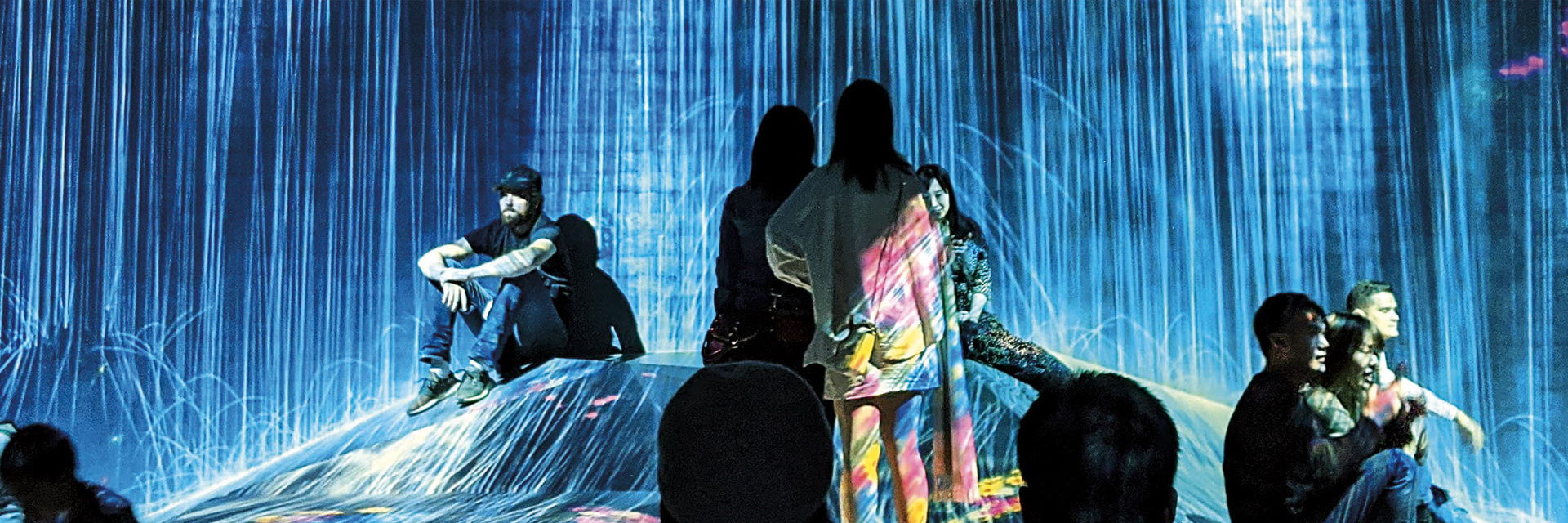Trends
How can we improve collective intelligence in a multilingual context?
A group of people who speak different languages is potentially richer, culturally speaking, as long as they can communicate. The means of communication used will probably have a significant influence on the group’s behavior. We asked this question to leading experts in the fields of language, digital media, and communication, in the firm belief that collective reflection is necessary to design multilingual groups capable of better decisions.
Sheriff Issaka

Sheriff Issaka
Data Scientist | AI/ML/NLP Expert | Entrepreneur & Innovator | Cloud Tech Enthusiast | Researcher | Localization | Bridging Human & Tech Collaboration for Impact
Sheriff Issaka is a King-Morgridge scholar graduate from the University of Wisconsin-Madison where he majored in Computer Science with minors in Entrepreneurship and African Studies. He is an Artificial Intelligence (AI) researcher, enthusiast, alarmist, and most interested in the intersection of cutting-edge AI technologies and society. His AI research includes analysis of the state of AI in Africa, AI optimization solutions in Midwest dairy farms, utilization of predictive and assessment models to improve operations in multinational banks, and the use of generative adversarial networks for realistic image reconstruction. As part of Sheriff’s own African Languages Lab (All Lab) initiative, he works with teams around the world to build text-to-text translations, speech recognition, and conversational chatbots for low-resourced African languages.
Pretend this is 1326. You live in Mali, a few miles from the magnificent palace of the richest human to ever exist: Mansa Musa. You live in a thriving community where everyone speaks the same language, Mandinka. Just like most people in your community, you have started practicing Arabic as your entire family recently recited the shahadah- proclaiming there is no deity, but Allah (SWT) and Muhammad (PBUH) is the Messenger of Allah.
Yesterday, you came across a group of slaves who lost their basic rights of freedom because their kingdom had lost in the war two years ago, speaking a language you did not recognize. They only had a few months more to pay off their debt and would be freed to join the community as equal members. In as much as you acknowledge their humanity, you have no sense of ‘them’ or yourself being “African.” You only saw yourself, them, and everyone else just as hadamadingolu: humans. Fast forward to 2023, when most people’s perspective of Africa is a place to be avoided for socio-economic pursuits with their imagery of the place shaped by the likes of Tarzan. Yet, somehow, you are seated at a coffee shop in Chicago reading about the geographical embodiment of the proverbial melting pot of languages: Africa; embodying over a third of all world languages, over 2000 of them.
As a Machine Learning Engineer who specializes in Natural Language Processing, you spend a lot of time thinking about languages, and you’ve recently been interested in answering the question of how collective intelligence can be harnessed in a multilingual context. By your definition, collective intelligence is the orchestrated collaborative gathering of people from all backgrounds to bring together the knowledge of their cultures, experiences, data, expertise, and languages to foster collective innovation, invention, awareness, and disruption geared toward solving formidable issues that transcend all of society.
From genome sequencing to crowdsourcing data for low-resourced languages, your long existence has shown you that collective intelligence works and has been a profound asset to societies, especially in multilingual settings. The question isn’t even if it’s been advocated for, possible, or previously leveraged. The real question is how it can be significantly harnessed to solve more complex problems like poverty, global warming, artificial intelligence, and disease on a global scale. There is no better way to demonstrate the existence and long-standing advocacy for collective intelligence in a multilingual context than through the African philosophy of Ubuntu: an ideology that affirms the positive values of community, difference, antiracism, hospitality, collaboration, and openness to others. This philosophy pushes for all of humanity to see one another as hadamadingolu and work together not in spite of, but because of strengthening differences like race, creed, gender, country, and language.
Having lived this long and seen cultural and technological trajectories evolve on a global scale, you strongly believe that a combination of humans and machines is the optimal configuration for meaningfully scaling and associatively harnessing the promise of collective intelligence in a multilingual landscape.
This combination of humans and machines could take many forms such as using universal visualizations and standardized mathematics and algorithms underneath localized interfaces, that encourage and thrive on participation across languages. Your friend recently said something along the lines of “a lot of global issues would be resolved if everyone spoke the same language.” While this assessment is not entirely unwarranted, it is a myopic look that fails to consider the cultural significance, diversity, history, symbolic meaning, and wealth that languages embody. Your answer to this assertion was, “I don’t know about you, but I wouldn’t want to live in such a world.” Collective intelligence presents humans with the unique ability to build, enhance, and maintain roadmaps of strategies, methodologies, and centralized resources for creating, democratizing, and innovating to resolve formidable societal issues.
By augmenting and creating advanced collective intelligence approaches that harness human innovation, empathy, and intention coupled with the speed, idempotency, and processing power of state-of-the-art technologies, humanity simply wins. As you step out of the coffee shop with the sun piercing your face, you squint to see the beautiful interaction and diversity of humanity and everything we’ve built at its fullest. You truly appreciate the proverb your grandma once told you: “a single broomstick breaks, but when you put them together, they don’t.”
TWI
Yɛ wo ho sɛ eyi yɛ afe 1326. Wote Mali, a efi onipa a ɔyɛ ɔdefo sen biara a watena hɔ pɛn ahemfie a ɛyɛ nwonwa no so kɔ hɔ yɛ akwansin kakraa bi: Mansa Musa.
Wote mpɔtam a ɛrenya nkɔso a obiara ka kasa koro, Mandinka. Te sɛ nnipa dodow no ara a wɔwɔ wo mpɔtam hɔ no, woafi ase resua Arabic kasa sɛnea w’abusua nyinaa kenkan shahadah nnansa yi ara– wobɔ dawuru sɛ onyame biara nni hɔ, nanso Allah (SWT) ne Muhammad (PBUH) yɛ Allah Somafo.
Nnora, wuhyiaa nkoa ekuo bi a wɔhweree wɔn ahofadi hokwan atitiriw esiane sɛ wɔn ahenni adi nkoguo wɔ ɔko no mu mfe mmienu a atwam ni nti, na wɔka kasa bi a wunnim. Ná wɔwɔ bosome kakraa bi pɛ a wɔde betua wɔn ka no na na wobenya ahofadi akɔka mpɔtam hɔfo ho sɛ asɔremma a wɔyɛ pɛ.
Wɔ dodow a wugye wɔn adesamma su tom mu no, wunni adwenmpɔ biara sɛ ‘wɔn’ anaa w’ankasa woyɛ “Afrikani.” Wohunuu wo ho, wɔn, ne obiara nko ara sɛ hadamadingolu: nnipa.
Kɔ yɛn anim ntɛmntɛm kɔ afe 2023 mu, bere a nnipa dodoɔ no ara adwene wɔ Afrika ho yɛ beae a ɛsɛ sɛ wɔkwati ma asetra ne sikasɛm mu nneɛma a wɔde wɔn mfonini a ɛfa beae a nnipa te sɛ Tarzan hyehyɛe no so. Nanso, ɔkwan bi so no, wote kɔfetɔnbea bi mu wɔ Chicago rekenkan sɛnea kasa ahorow a wɔde bɛ mu no yɛ no ho asɛm: Afrika; a wiase kasa horow nyinaa mu bɛboro nkyem abiɛsa mu biako na ɛwom, na emu bɛboro 2000.
Sɛ́ Mfiri Adesua Mfiridwumayɛfo a ne ho akokwaw wɔ Abɔde mu Kasa Ho Dwumadi mu no, wode bere pii susuw kasa ahorow ho, na nnansa yi ara w’ani gyee ho sɛ wubebua asɛmmisa a ɛfa sɛnea wobetumi de nyansa a wɔaboaboa ano adi dwuma wɔ kasa horow pii mu no ho. Sɛnea wo nkyerɛase no, nyansa a wɔbom yɛ yɛ nnipa a wofi mmeae ahorow nyinaa a wɔbom boaboa wɔn ho ano de bom de nimdeɛ a ɛfa wɔn amammerɛ, osuahu, nsɛm, nimdeɛ, ne kasa ahorow ho bom de hyɛ nneɛma foforo a wɔbom yɛ, nneɛma foforo a wɔyɛ, nhumu, ne ɔhaw a wɔasiesie sɛ wɔde bedi nsɛm a ɛyɛ hu a ɛboro ɔmanfo nyinaa so.
Efi genome a wɔde di dwuma nnidiso nnidiso so kosi nnipadɔm ho nsɛm a wɔde hwehwɛ kasa horow a wɔmfa nneɛma pii nka ho so no, wo atrae bere tenten no ama woahu sɛ nyansa a wɔbom nya yɛ adwuma na ayɛ agyapade kɛse ama amanfo, titiriw wɔ mmeae a wɔka kasa horow pii. Asɛmmisa no nnyɛ mpo sɛ wɔakamfo akyerɛ, ebetumi aba, anaasɛ wɔadi kan de adi dwuma a. Asɛmmisa ankasa ne sɛnea wobetumi de adi dwuma kɛse de adi ɔhaw ahorow
a emu yɛ den te sɛ ohia, wiase nyinaa hyew, nyansa a wɔde ayɛ, ne nyarewa ho dwuma wɔ wiase nyinaa.
Ɔkwan pa biara nni hɔ a wɔbɛfa so akyerɛ sɛnea nnipa nyinaa nya nyansa wɔ hɔ ne bere tenten a wɔkamfo kyerɛ wɔ kasa horow pii mu sen Afrika nyansapɛ a ɛne Ubuntu: adwene a esi gyinapɛn pa a ɛfa mpɔtam hɔfo, nsonsonoe, mmusua mu nyiyim a wɔko tia, ahɔhoyɛ, adwumayɛkuw, ne nea wobue wɔn ani ma no so dua afoforo nso. Saa nyansapɛ yi piapia adesamma nyinaa ma wohu wɔn ho wɔn ho sɛ hadamadingolu na wɔbom yɛ adwuma ɛnyɛ ɛmfa ho, na mmom esiane nsonsonoe te sɛ abusuakuw, gyidi, ɔbarima ne ɔbea nna, ɔman, ne kasa a wɔhyɛ mu den nti.
Esiane sɛ woatena ase akyɛ saa na woahu sɛ amammerɛ ne mfiridwuma akwan horow no renya nkɔso wɔ wiase nyinaa nti, wugye di yiye sɛ nnipa ne afidie a wɔaka abom ne nhyehyɛe a
eye sen biara a wɔde bɛkari pɛ wɔ ntease mu na wɔde bɔhyɛ a ɛne sɛ wɔbɛbom anya nyansa wɔ kasa horow pii mu no adi dwuma wɔ fekubɔ mu.
Saa nnipa ne afidie a wɔaka abom yi betumi afa akwan horow pii so te sɛ amansan mfoniniyɛ ne akontaabu ne nhyehyɛe a wɔahyɛ da ayɛ a wɔde bedi dwuma wɔ mpɔtam hɔ nkitahodie ahorow ase, a ɛhyɛ nkuran na ɛyɛ yiye wɔ kyɛfa a wonya wɔ kasa ahorow mu no mu.
Nnansa yi ara w’adamfo no kaa biribi te sɛ “sɛ obiara ka kasa koro a, anka wobesiesie wiase nyinaa nsɛm pii.” Bere a saa nhwehwɛmu yi nyɛ nea ɛnteɛ koraa no, ɛyɛ adwene a wɔde hwɛ ade a entumi nsusuw amammerɛ mu ntease, ahorow ahorow, abakɔsɛm, sɛnkyerɛnne kwan so ntease, ne ahonyade a kasa ahorow ka ho no ho. Mmuae a wode maa saa asɛm yi ne sɛ, “Minnim wo ho asɛm, nanso anka mempɛ sɛ mɛena wiase a ɛte saa mu.”
Nyansa a wɔbom nya ma nnipa nya tumi soronko a wɔde bɛkyekye, ama ayɛ yiye, na wɔakura akwan horow a wɔfa so yɛ akwan, akwan horow, ne nneɛma a wɔde ahyɛ mfinimfini a wɔde bɛbɔ, ayɛ demokrase, na wɔayɛ nneɛma foforo de asiesie ɔmanfo nsɛm a ɛyɛ hu. Ɛdenam nyansa a wɔbom yɛ a ɛkɔ anim a wɔde nnipa nneɛma foforo, tema, ne adwene a wɔde di dwuma a wɔde ahoɔhare, tumi a wɔde yɛ adwuma, ne tumi a wɔde di dwuma wɔ mfiridwuma a ɛyɛ foforo mu ka ho a wɔma ɛyɛ kɛse na wɔbɔ so no, adesamma di nkonim ara kwa.
Bere a wufi adi kɔfetɔnbea hɔ a owia no rebɔ w’anim no, wobɔ w’ani sɛ wubehu nkitahodi fɛfɛ ne adesamma ahorow ahorow ne biribiara a yɛasi wɔ ne nyinaa mu. W’ani sɔ bɛ a wo nanabaa ka kyerɛɛ wo bere bi no ampa sɛ: “prayɛ biako ebu, nanso sɛ woka bom a, ɛmmu.”

Research Report 2023
• Make confident decisions using our benchmarks and statistics.
• Break down barriers and reach 100+ countries.
• Gain the AI insights, advice and tools to achieve your mission-critical priorities.
• Discover how the neurobiological perspective of language can open new ways of understanding.
• Build a bridge between research and corporate worlds.
Get your copy now
Andy Way

Andy Way
Full Professor in Computing @ Dublin City University | Co-founder & Deputy Director ADAPT Centre | Machine Translation & AI Thought-Leader | MT journal editor 2007-21 | EAMT President 2009-15 | IAMT Award of Honour 2019
Prof. Andy Way served as President of the European Association for Machine Translation from 2009-2015, and was President of the International Association for Machine Translation from 2011–13. He has been Editor of the Machine Translation journal since 2007. He is currently editing a series of six books for Springer in the area of Machine Translation, with two already published. Prof. Way’s research interests include all areas of machine translation: statistical MT, example-based MT, neural MT, rule-based MT, hybrid models of MT, MT evaluation, teaching MT.
Most reasonable, rational people would not find the following assertions to be problematic: A group of people who speak different languages is potentially richer, culturally speaking, as long as people can communicate. The means of this communication will probably have an important influence on the group’s behaviour. A reflection is necessary to design multilingual groups capable of better decisions. But even if it is necessary, it may not be easy.
Despite the widespread claims of English being a lingua franca, this is far from being an actuality today. In any case, in a European context, it flies in the face of our very ideals; in varietate concordia (“united in diversity”), the official Latin motto of the EU, illustrates that the many different cultures, traditions and languages in Europe are a hugely positive asset for the continent. In Europe’s multilingual setup, all 24 official EU languages are granted equal status by the EU Charter and the Treaty on the EU. Moreover, the EU is home to 60+ regional and minority languages which are protected and promoted under the European Charter for Regional or Minority Languages treaty since 1992,1 in addition to migrant languages and various sign languages, spoken by some 50 million people.
In the European Language Equality (ELE) project2 which I coordinate, our aim is to protect this language diversity by promoting a large-scale funding programme over the next decade to ensure that all Europe’s languages are digitally viable. Our findings over the past two years demonstrate a very sorry state of affairs: despite the obvious improvements in language technology (LT) since the implementation of methods based on neural networks, language barriers still hamper cross-lingual communication and the free flow of knowledge across borders, and many languages are endangered or on the edge of extinction. On a global scale, the situation is far worse. Accordingly, then, translation technology has a vital role to play in addressing these problems, but its capabilities have been hugely overhyped. While in principle the techniques involved in neural machine translation (NMT) apply to any pair of languages, in practice demands on data availability restrict these to a small subset of the world’s languages, so claims by multinational corporations of “bridging the gap between human and machine translation [quality]” or “human parity” are massively overblown. In another European project in which we participate, EUCom- Meet, 3 we are attempting to facilitate multilingual communication between speakers in the context of deliberative democracy. In many European countries, citizens’ assemblies have been set up as a response to the challenges besetting liberal democracies. These assemblies are participatory spaces created to improve the democratic practice by directly linking citizens with policy makers. Many of the issues faced across Europe currently are similar (e.g. immigration, climate change, Ukraine war, cost of fuel etc.), so discussions are taking place in these respective citizens’ assemblies, but in a monolingual context. What we have done in my team is build 30 NMT engines to allow real-time effective communication across language boundaries. We have road-tested these NMT systems against Google Translate,4 and the vast majority outperform this well-regarded tool. The systems are currently undergoing testing with real users across the languages of the project (English, French, German, Irish, Italian and Polish), but initial signs are very positive that the multilingual communicative process can indeed be supported by MT. In sum, then, we can see that real efforts are being made in Europe to facilitate effective communication between speakers of different languages. Allowing people to speak their own languages enriches the process, as users are immediately more comfortable, and coming from different cultural and linguistic backgrounds ensures a richer, more beneficial experience for all, with better decision-making and improved outcomes as a result. If this is to be extended to speakers of all European languages – not just those that have ample resources, but languages without a strong written tradition, as well as non-oral languages like sign languages – then all our languages need to be protected and supported so that they can continue to thrive, so that speakers can operate using their language of choice, as opposed to one that is imposed on them.
This is far from easy, but the nettle has to be grasped now before it is too late. LT is playing an increasingly important role in the daily lives of many European citizens. Looking ahead, it is possible to foresee intriguing opportunities and new capabilities in this regard, but also a range of uncertainties and inequalities that may leave several groups increasingly disadvantaged. It cannot be the case that LT development is driven only by the economic status of a language’s users, rather than sheer demographic demand. If the ELE programme calling for LT support for both low- and high-resource languages is funded, then new LT systems can be developed using increased resources (experts, data, computing facilities etc.) for every European language and domain of application, to the benefit of us all.

Daniel Pimienta

Daniel Pimienta
Responsible at the Observatory of Linguistic & Cultural Diversity on the Internet.
Daniel Pimienta is a board member and former Exec. Sec. of the World Network for Linguistic Diversity (MAAYA). He manages the Observatory of languages and cultures on the Internet since 1989 being a pioneer in cyber-metrics and the measure of the space of languages in the Internet. He was given, in 2008, the Namur Award for his comprehensive actions in the perspective of a positive social impact of ICT.
If the thematic context is that of mathematics, a universal language in every sense of the term, the question is unlikely to arise. However, in all other contexts, scientific or otherwise, we face the issue of making linguistic and cultural diversity an asset rather than a
limitation, and the answer is not simple.
Accepting English as the lingua franca of the collective, as is too often the case today, is a last resort that does not give credit to the diversity of intelligences and does not encourage the best possibilities for synergies. The trend today, as shown by the study on the evolution of languages on the Internet carried out by the Observatory of Linguistic and Cultural Diversity on the Internet, is clearly in favor of multilingualism and therefore of translation as a lingua franca, as the visionary Umberto Eco had already noted in 1993, focusing on Europe. In the 2000s, the Networks and Development Foundation (https://funredes.org) conducted a collective intelligence experiment in Latin America, within the framework of a virtual community, around a project on the social impact of information and communication technology. The approach chosen to manage communications within the virtual community was a combination of human translation and machine translation, so as to optimize the ratio of cost to comprehension.
A group was responsible for writing the summary of each communication, translating it into the four working languages (English, Spanish, French, and Portuguese). The members received the message in the chosen language along with the translation of the summary and a machine-translated version of the entire message, as well as the message in its original language. During face-to-face meetings involving a limited number of people from the virtual community, similar efforts were made. This was done for each segment of the meeting so as to involve, asynchronously and remotely, the vast majority of members not physically present at the meeting. It was thus acknowledged that the center of gravity of the group resided more in the virtual community than in the physical meeting, and remote participation was interwoven with face-to-face participation by creating spaces after each segment. The face-to-face participants could also manifest themselves virtually at the same time, bringing a kind of creative fractality to the system. After intense online discussions, a magnificent document of collective intelligence was produced by this community of 500 researchers and activists on the theme of the social impact of the Internet, in the four working languages. Twenty years later, “Working the Internet with a social vision” remains impressively topical.
Could the spectacular progress of machine translation over the last few years now allow us to forgo the effort of human-translated summaries? Could the summaries themselves be left to artificial intelligence? Has the synchronous software developed today (such as the Zoom platform) made asynchronous methods obsolete? These are legitimate questions, and economic pragmatism could prevail in the direction of positive answers.
Participation in too many international meetings in English, where this same pragmatism claimed to “justify” savings on interpreting services, warns of the dangers of this false pragmatism: many brilliant people who were not native speakers of English saw their potential contributions obliterated by the imposed use of a language which they had apparently mastered but in which in reality they could not express their ideas fully in a nuanced way. The cost was enormous if we measure the pooling of intelligence and knowledge in these meetings. In the same way that there are patent dangers in the biases of the new tools of artificial intelligence (AI), often hidden in the data that has fed deep learning, the impacts of the biases caused implicitly by the renunciation of translation or interpretation in multinational collective contexts, can greatly exceed the costs.
Diversity is a fundamental factor of intelligence in all its forms and at all scales: in ecology, biology, economics, etc., and the list is long. Anything that restricts diversity reduces intelligence, and human groups are no exception. Just look at how social network algorithms, by enclosing people in increasingly narrow bubbles of belief and isolating them from the diversity of ideas and opinions, have succeeded in reducing the collective intelligence of people who leave behind the world of science and identify with the most absurd conspiracy theories, limiting their ability to understand the dangers.
The solutions to be implemented to unleash collective intelligence in a multilingual context must also be diverse. It is not a question of renouncing technological progress and advances in AI; it is rather a question of establishing balance between the role of “automatic” tools and that of human contributions, which are not automatic in their essence. Of course, the economic criterion has its place in decisions, but it cannot be the only option leading to solutions that eliminate the human factor and make us powerless in the face of the inevitable and too often ignored or even hidden biases of technologies. Humanity’s current challenges are increasingly systemic, that is, characterized by high complexity, which manifests itself through a large number of interrelated factors. Approaches to these challenges must respond to this complexity through the diversity of human intelligences applied collectively.
The treatment of linguistic diversity that this context imposes must be identified as one of the key factors in the response and deserves particular attention, far from simplistic pragmatism, whether technological or linguistic reductionism.
FRENCH
Il est probable que si le contexte thématique est celui de la mathématique, un langage universel dans tous les sens du terme, la question ne se pose pas. Cependant, dans tous les autres contextes, scientifiques ou non, la question se pose de faire de la diversité linguistique et culturelle un atout, plutôt qu’une limitation, et la réponse n’est pas simple.
Accepter, comme c’est trop souvent le cas aujourd’hui, que la langue anglaise soit la lingua franca du collectif est un pis-al- ler qui ne donne pas crédit à la diversité des intelligences et n’encourage pas les meilleures possibilités de synergies. La tendance, comme le montre l’étude de l’évolution des langues dans l’Internet de l’Observatoire de la diversité linguistique et culturelle dans l’Internet est clairement aujourd’hui en faveur du multilinguisme et donc de la traduction comme lingua franca, comme l’avait déjà noté, en visionnaire, Umberto Eco, en 1993, en ciblant l’Europe.
L’Association Réseaux et Développement a mené, dans les années 2000, une expérience d’intelligence collective en Amérique latine, dans le cadre d’une communauté virtuelle, autour d’un projet sur l’impact social des technologie de l’information et la communication. L’approche choisie pour gérer les communications, à l’intérieur de la communauté virtuelle, était une combinaison entre la traduction humaine et la traduction automatique, de manière à optimiser le rapport coût versus compréhension.
Un groupe était chargé de rédiger la synthèse de chaque communication, de la traduire dans les quatre langues de travail (anglais, espagnol, français et portugais) et les membres recevaient le message, dans la langue choisie, avec, à la fois, la traduction humaine de la synthèse et la traduction par programme de l’ensemble du message, ainsi que le message dans sa langue originale. Lors de réunions présentielles, concernant un nombre limité de personnes de la communauté virtuelle, des efforts analogues étaient conduits. Cela, à chaque segment de la réunion, de manière à faire participer, de manière asynchrone et à distance, la grande majorité des membres non présents physiquement dans la réunion. Ainsi, il était reconnu que le centre de gravité du groupe résidait plus dans la communauté virtuelle que dans la réunion physique et la participation à distance était articulée avec la participation présentielle, en ménageant des espaces après chaque segment. Les participants présentiels pouvaient également, et en même temps, se manifester à travers de la virtualité, apportant une espèce de fractalité créative au dispositif. Après d’intenses discussions en ligne, un magnifique document d’intelligence collective a ainsi été produit par cette communauté de 500 chercheurs et activistes sur le thème de l’impact social de l’Internet, dans les quatre langues de travail : « Travailler l’Internet avec une vision sociale » qui reste, vingt après, d’une actualité impressionnante.
Est-ce que les spectaculaires progrès de la traduction automatique dans les vingt dernières années permettraient aujourd’hui de s’affranchir de l’effort de traduction humaine des synthèses? Est-ce que les synthèses, elles-mêmes, pourraient être laissées au soin de l’intelligence artificielle? Est- ce que les dispositifs synchrones mis au point aujourd’hui (comme la plateforme Zoom) ont rendu caduques les méthodes asynchrones ? Ce sont des questions légitimes et le pragmatisme économique pourraient emporter la décision dans le sens de réponses positives.
La participation à trop de réunions internationales en anglais, où ce même pragmatisme prétendait « justifier » l’économie de l’interprétation, et où de nombreuses personnes brillantes, mais non anglophones, ont vu leurs apports potentiels oblitérés par l’usage imposé d’une langue qu’elles maitrisaient en apparence mais dans laquelle en réalité elles ne pouvaient pas exprimer leurs idées pleinement et subtilement, avertit des dangers de ce faux pragmatisme. Son prix a été énorme si l’on mesure la mise en commun des intelligences et des savoirs dans ces réunions. De la même manière que les danger des biais des outils nouveaux de l’intelligence artificielle (IA), souvent cachés dans les données qui ont nourri l’apprentissage profond, sont patents, les impacts des biais provoqués implicitement par le renoncement à la traduction ou l’interprétation, dans des contextes collectifs multinationaux, peuvent dépasser largement les coûts.
La diversité est un facteur fondamental de l’intelligence sous toutes ces formes et à toutes les échelles : en écologie, en biologie, en économie, etc. et la liste est longue. Tout ce qui bride la diversité réduit l’intelligence et les groupes humains ne font pas exceptions. Il suffit de voir comment les algorithmes des réseaux sociaux, en enfermant les personnes dans des bulles de croyance de plus en plus étroites et, en les isolant de la diversité des idées et opinions, ont réussi à réduire l’intelligence collective d’un pourcentage aussi notable de personnes qui échappent au monde de la science et s’identifient aux théories du complot les plus absurdes, pour comprendre les dangers.
Les solutions à apporter pour débrider l’intelligence collective dans un contexte multilingue doivent également être diverses. Il ne s’agit pas de renoncer aux progrès technologiques et aux avancées de l’IA : il s’agit plutôt d’établir des équilibres entre la part des outils « automatiques » et celle des apports humains, non automatiques par essence. Bien sûr, le critère économique à sa place dans les décisions, mais il ne peut être l’option unique conduisant à des solutions qui éliminent le facteur humain et nous rendent impuissants face aux biais inévitables, et trop souvent ignorés, voire cachés, des technologies.
Les défis actuels de l’humanité sont de plus en plus systémiques, c’est-à-dire caractérisés par une complexité croissante, qui se manifeste à travers la grande quantité de facteurs intercorrélés. Les approches à ces défis doivent répondre à cette complexité par la diversité des intelligences humaines mises en œuvre collectivement.
Le traitement de la diversité linguistique que ce contexte impose doit être identifié comme un des facteurs clefs de la réponse et mérite une attention particulière, loin des pragmatismes simplistes, qu’ils soient technologiques ou de réductionnisme linguistique.
Paulina Zguda

Paulina Zguda
PhD candidate in philosophy at the Doctoral School in Humanities at Jagiellonian University
Paulina Zguda is a cognitive scientist and currently a PhD candidate in philosophy at the Doctoral School in Humanities at Jagiellonian University. Her main research interest is how people react to social robots, and in particular, how their aesthetics – design, movement and additional factors (e.g. possible clothing) – determine people’s perceptions of these artificial agents.
In the scientific world, knowledge of English is a prerequisite, and researchers can often experience immersion in a language that is not their mother tongue. However, the most interesting experience of how language affects the collective intelligence of a group was for me to participate in Erasmus+ projects on several occasions. Some of them involved people whose level of English was communicative or very basic. It was only through prolonged interaction with such people, with whom I had to plan, act and create together, that I realised what a privilege it is to have internalised knowledge of English. In my generation (people born in the 1990s) it is so common as to be almost invisible. Most of my friends can switch freely between Polish and English. Of course, there are some people who are not fluent – but this is a definite minority. This ubiquity of English makes it possible at times to forget what to do when not all members of the group are equally advanced. You can’t just exclude them – then not only is the person lost, but also their sum of experience, skills, perspective, and as a result the group is weakened. How to solve this?
The simplest solution is to provide a simultaneous interpreter to act as an intermediary between the group and the person(s) who do not speak the group’s main language. But what if the interpreter is not available? What if the interpreter is not an expert in the field and his/her interpretation is unmeasured and reductionist, making the flow of information ineffective? Last year I participated in a project in which most of the participants were fluent in English. The exceptions were a few people who were communicatively fluent in the language, as well as someone who could only use a few basic words. Observing this communication was an unusual experience – the project focused on the phenomenon of professional burnout, so most of the workshops included not only lectures, but were also based on sharing one’s own experiences. I observed how what the presenter says is consistently communicated, often in a very abbreviated, condensed way. I do not speak Italian, so I was not in a position to know how correct the message conveyed was, but I guessed what an effort it was for the volunteer interpreter, who had to not only focus on the subject of discussion, assimilate new knowledge, internalise it and respond to it in some way, but in addition, in a very dynamic situation, translate concisely and understandably. It is important to emphasise the fact that English was not the first language for the volunteer interpreter. It is the practice of the greatest understanding of the matter – involuntarily teaching on the knowledge that one has just received.
There was a similar effort on the part of the listening participant – she had to maintain her attention in an unfavourable situation (an unintelligible discussion in English could be background noise for her) in order to absorb condensed information every now and then, at irregular intervals. Looking at it from a third-person perspective, it was noticeable that the listening party often drifted off in thought. By being involved in the discussion and willing to share experiences, she was able to participate in a different, equally intense, but more creative way, consuming additional effort in non-verbal communication. Importantly, this involvement of part of
the group influences the experience of the whole – firstly, the translation and related discussion (additional explanations of new terms, reassurance about the content heard) prolongs the lecture or discussion process. It also affects the way in which communication takes place – when interacting with people who are not fluent in the language spoken by the group, most group members will begin to use simpler, more direct language that is intended to facilitate communication. There may be more expressive gestures, as well as an emphasis on body language, the use of international phrases or the weaving of phrases from the native language of the linguistically excluded person into the argument.
All of these activities are the collective work of the group, focused on adding further value to the content being conveyed facilitating learning. This requires coordination and patience, but can be an element that builds an additional bond between group members. And it is this bond that can enhance collective intelligence in a multilingual context for the communication process to be effective, it is important to ensure that each group member feels the validity of understanding each other. Despite being universally proficient in English and using it freely in diversified contexts, our personalities can change depending on the language we use. In one’s native language, one may feel freer, more charismatic, funnier, more intelligent. A foreign language, on the other hand, can allow one to shorten the distance. I observed this particularly strongly during conversations with Japanese people fluent in English – hierarchical Japanese vs direct English shaped the expressions of the interviewees.
The true potential of the group should be realised regardless of which language is currently spoken. In addition, favouritism towards native speakers of English should be avoided – because of their privileged position, they may unwittingly dominate the group. This can be done through the use of simpler language, with an emphasis on not patronising non-native speakers of English, as well as clarity of argument. Investing in projects such as ‘Service-Oriented Collective Intelligence for Multicultural Society’ (Inaba and Ishida, 2009), aimed at augmenting international communication with nuances that may be missed during translation, would positively affect the collective intelligence of the group that would use such tools.
Polish
W świecie naukowym znajomość angielskiego to warunek konieczny, a badacze często mogą doświadczyć immersji w język, który nie jest ich ojczystym. Jednakże najciekawszym doświadczeniem tego, jak język wpływa na inteligencję zbiorową grupy, było dla mnie kilkukrotne uczestnictwo w projektach Erasmus+. W niektórych z nich brały udział osoby, których poziom znajomości angielskiego był komunikatywny bądź bardzo podstawowy. Dopiero długotrwała interakcja z takimi osobami, z którymi miałam wspólnie planować, działać i tworzyć, uświadomiła mi, jakim przywilejem jest zinternalizowana znajomość języka angielskiego. W moim pokoleniu (ludzie urodzeni w latach 90.) jest ona tak powszechna, że wręcz niedostrzegalna. Większość moich znajomych może swobodnie przełączać się między polskim a angielskim. Oczywiście, zdarzają się osoby, które nie są płynneale jest to zdecydowana mniejszość. Ta powszechność angielskiego sprawia, że momentami można zapomnieć o tym, co zrobić, gdy nie wszyscy członkowie grupy są tak samo zaawansowani. Nie można ich po prostu wykluczyć – wtedy stracona jest nie tylko osoba, ale też jej suma doświadczeń, umiejętności, perspektywa, a w efekcie – grupa zostaje osłabiona. Jak to rozwiązać? Najprostszym rozwiązaniem jest zapewnienie tłumacza symultanicznego, który będzie pośrednikiem między grupą a osobą (osobami) nieznającą głównego języka grupy. Co jednak w sytuacji, gdy tłumacz jest niedostępny? Co wtedy, gdy tłumacz nie jest ekspertem w danej dziedzinie i jego tłumaczenie jest niewymierne i redukcjonistyczne, przez co przebieg informacji nie jest efektywny?
W ubiegłym roku uczestniczyłam w projekcie, w którym większość uczestników biegle posługiwała się angielskim. Wyjątkiem było kilka osób, które znały ten język w stopniu komunikatywnym, jak również osoba potrafiąca posługiwać się wyłącznie paroma podstawowymi słowami. Obserwowanie tej komunikacji było niezwykłym doświadczeniem – projekt skupiał się na zjawisku wypalenia zawodowego, większość warsztatów zawierała więc nie tylko wykłady, ale opierała się również na dzieleniu się własnymi doświadczeniami. Obser- wowałam, jak to, co mówi prowadzący, jest konsekwentnie przekazywane, często w bardzo skrócony, skondensowany sposób. Nie znam włoskiego, więc nie byłam w stanie do- wiedzieć się, jak poprawny jest przekazywany komunikat, ale domyślałam się, jakim wysiłkiem była praca tłumacza-wo- lontariusza, który musiał nie tylko skupić się na przedmiocie dyskusji, przyswoić sobie nową wiedzę, zinternalizować ją i w jakiś sposób się do niej ustosunkować, a dodatkowo w bardzo dynamicznej sytuacji zwięźle i zrozumiale przetłuma- czyć. Należy podkreślić fakt, że dla tłumacza-wolontariusza angielski nie był pierwszym językiem. To praktyka najwięk- szego zrozumienia sprawy – mimowolnego uczenia na temat wiedzy, którą dopiero co otrzymaliśmy.
Podobny wysiłek leżał po stronie słuchającej uczestniczki – musiała utrzymać uwagę w niesprzyjającej sytuacji (niezro- zumiała dyskusja po angielsku mogła być dla niej szumem w tle), by co chwilę, w nieregularnych interwałach, przyswajać skondensowane informacje. Patrząc na to z perspektywy trzecioosobowej, można było zauważyć, że strona słuchająca często odpływa myślami. Dzięki zaangażowaniu w dyskusję i chęci dzielenia się doświadczeniami, mogła partycypować w inny, równie intensywny, ale bardziej kreatywny sposób, spożytkując dodatkowy wysiłek na komunikację niewerbalną. Co ważne, to zaangażowanie części grupy wpływa na doświadczenie całości – po pierwsze, tłumaczenie i związana z nim dyskusja (dodatkowe wyjaśnienia nowych terminów, upewnianie się co do usłyszanej treści) wydłuża proces wykładu czy dyskusji. Wpływa także na sposób komunikacji – w przypadku interakcji z osobami bez płynności w języku, którym posługuje się grupa, większość jej członków zacznie używać prostszego, bardziej bezpośredniego języka, który ma ułatwić komunikację. Może pojawić się bardziej ekspresyjna gestykulacja, jak również postawienie akcentu na mowę ciała, używanie międzynarodowych zwrotów bądź wplątywanie do wywodu zwrotów z języka natywnego osoby wykluczonej lingwistycznie.
Wszystkie te działania są kolektywną pracą grupy, skupionej na dodaniu do przekazywanej treści kolejnej wartości – ułatwienia przyswojenia wiedzy. Wymaga to koordynacji i cierpliwości, ale może stanowić element budujący dodatkową więź między członkami grupy. I właśnie ta więź może wzmocnić kolektywną inteligencję w wielojęzycznym kontekście – aby proces komunikacji był efektywny, należy zadbać o to, by każdy członek grupy czuł zasadność zrozumienia się nawzajem. Pomimo powszechnej znajomości angielskiego i używania go w swobodny sposób w zdywersyfikowanych kontekstach, nasza osobowość może zmieniać się w zależności od używanego języka. W języku ojczystym można czuć się swobodniej, być bardziej charyzmatycznym, zabawnym, inteligentniejszym. Z kolei obcy język może pozwolić na skracanie dystansu. Obserwowałam to szczególnie silnie podczas roz- mów z Japończykami płynnie posługującymi się angielskim – zhierarchizowany japoński vs bezpośredni angielski kształtował sposób ekspresji rozmówców.
Prawdziwy potencjał grupy powinien zostać wykorzystany niezależnie od tego, który język jest obecnie używany. Należy dodatkowo unikać faworyzacji natywnych użytkowników języka angielskiego – z powodu ich uprzywilejowanej pozycji, mogą oni mimowolnie zdominować grupę. Można to zrobić za pomocą używania prostszego języka, z naciskiem na brak protekcjonalności względem nienatywnych użytkowników angielskiego, jak również klarowność wywodu. Inwestycja w takie projekty, jak «Service-Oriented Collective Intelligence for Multicultural Society» (Inaba i Ishida, 2009), mających na celu poszerzenie komunikacji międzynarodowej z uwzględnieniem niuansów, które mogą umknąć podczas translacji, pozytywnie wpłynie na kolektywną inteligencję grupy, która korzystałaby z takich narzędzi.

World Wide Wisdom
Research Report 2023
It is possibile to improve the understanding between people that speak different languages and thus improve their ability to do things together in a smarter way? Can it be that a multilingual group is able to do better things? In order to answer to these questions we need to take into account how groups of people think and work together and how their collaboration can be improved.
Get Your Copy Now!Renato Beninatto

Renato Beninatto
CEO Nimdzi Insights
Renato Beninatto is the co-author of The General Theory of the Translation Company and leads Nimdzi Insights, a think-tank and consulting company that focuses on growth strategies for localization leaders. A former executive in some of the leading companies in the industry, Renato is also the co-host of The Global Podcast.
Various scientific studies have provided compelling evidence that a culturally and socially diverse group is smarter than a homogeneous group. Collective intelligence is a phenomenon that arises when a group of individuals work together to produce a result that would be impossible for a single individual to obtain. In this context, diversity increases creativity and innovation. Each participant in a diverse group contributes their knowledge and perspectives, leading to better decision making and problem solving.
One way to express diversity is through collaboration among people from different cultures who communicate in different languages. Each language contains a different view of the world. A well-known cliché is that Eskimos have many different words for snow, whereas someone like me, who was born in a tropical country and only saw snow for the first time as an adult, would not know how to describe what kind of snow I was seeing.
Imagine the exponential factor of this one example. If each language embodies a specific part of human knowledge, a unique collective experience, a recipe for dealing with problems that are common in one place but rare in others, reducing or eliminating linguistic barriers is a great way to increase collective intelligence.
A desert dweller sees the world differently than someone who lives in the Amazon rainforest and thus uses terminology specific to their environment. The experience contained in popular sayings, jokes, songs, and other cultural expressions that are specific to each language contributes to the diversity and intelligence of any group.
However, creating effective collective intelligence in a multilingual context can be challenging; many factors may affect communication and collaboration between individuals who speak different languages. A number of measures can be taken to overcome these obstacles and maximize the potential for collective intelligence.
First, it is important to promote linguistic diversity. This can be done by encouraging the use of multiple languages for communication and providing training and resources so that individuals can learn new languages and improve their language skills. It is also important for individuals to feel comfortable and safe expressing their ideas in any language, without fear of criticism or negative judgments based on stereotypes.
Then there is the need to promote inclusion and tolerance. This means creating a work environment where everyone feels welcome and respected, regardless of their language or cultural background. It is fundamental that all team members feel comfortable expressing their ideas and actively participating and that all opinions are considered equally valuable. To do this, it is important to ensure that all team members have access to the relevant information and resources in their language. This can include the provision of training and information materials in multiple languages to all those who are interested or hiring interpreters for important events and meetings. This is where new technologies are key in order to reduce or eliminate barriers to information sharing.
The spread of machine translation tools and the rapid development of subtitling and machine interpretation technologies, combined with the proliferation of virtual meetings, have created an environment that facilitates the rapid expansion of multidisciplinary and multilingual working groups. The dramatic reduction in the time required to translate documents in any format (including audio and video), as well as a decrease in translation costs, means that intelligence no longer belongs only to major academic or business centres. In the book The Wisdom of Crowds, James Surowiecki describes four elements that determine the success of a group: diversity of opinion, independence decentralization, and aggregation. Eliminating language barriers will optimize the factors that contribute to better collective intelligence.
PORTUGUESE
Está mais do que comprovado por diversos estudos científicos que um grupo diversificado culturalmente e socialmente é mais inteligente que um grupo homogêneo.
A inteligência coletiva é um fenômeno que surge quando um grupo de indivíduos trabalha em conjunto de maneira a criar um resultado que seria impossível de ser alcançado por um indivíduo sozinho. Nesse contexto, diversidade aumenta a criatividade e a inovação. Cada participante de um grupo diversificado incorpora seus conhecimentos e perspectivas, levando a melhores tomadas de decisão e resolução de problemas. Uma forma de expressão da diversidade é a colaboração entre pessoas que vêem de culturas diferentes e se comunicam em idiomas diferentes. Cada idioma contém um olhar diferente do mundo. O famoso clichê do esquimó que tem muitas palavras diferentes para neve enquanto eu, que nasci num país tropical, só fui ver neve pela primeira vez como adulto e não saberia descrever que tipo de neve foi.
Imagine o fator exponencial desse pequeno exemplo. Se cada idioma contém em si uma parte específica do conhecimento humano, uma vivência coletiva própria, uma receita para encarar problemas que são comuns em um lugar mas raros em outros, diminuir ou eliminar a barreira linguística é uma excelete forma de ampliar a inteligência coletiva.
Um habitante do deserto vê o mundo com olhos diferentes de um habitante da floresta amazônica e por isso usa terminologias específicas para o seu ambiente. Essa experiência contida em ditados populares, piadas, canções e outras expressões culturais específicas de cada idioma contribui para a diversidade e a inteligência de qualquer grupo.
No entanto, a criação de uma inteligência coletiva eficaz em um contexto multilingue pode ser um desafio, pois existem muitos fatores que podem afetar a comunicação e a colaboração entre indivíduos de diferentes idiomas. Para superar esses obstáculos e maximizar o potencial da inteligência coletiva existem algumas medidas que podem ser tomadas. Primeiro, é preciso promover a diversidade linguística. Isso pode ser feito incentivando o uso de vários idiomas na comunicação e oferecendo treinamento e recursos para que os indivíduos possam aprender novas línguas e aprimorar suas habilidades linguísticas. Além disso, é importante que os indivíduos se sintam confortáveis e seguros para expressar suas ideias em qualquer idioma, sem medo de críticas ou julgamentos negativos baseados em estereótipos.
Em seguida, é preciso promover a inclusão e a tolerância. Isso significa criar um ambiente de trabalho onde todos os indivíduos se sintam acolhidos e respeitados, independentemente de sua língua ou de sua origem cultural. É importante que todos os membros da equipe se sintam confortáveis para expressar suas ideias e participar ativamente e que todas as opiniões sejam consideradas igualmente valiosas.
Para isso, é importante garantir que todos os membros da equipe tenham acesso a informações e recursos relevantes, independentemente de seu idioma. Isso pode incluir tornar acessíveis a todos os interessados materiais de treinamento e de informação em vários idiomas ou a contratação de intérpretes para eventos e reuniões importantes.
É neste ponto que as novas tecnologias exercem um papel fundamental: o de reduzir ou eliminar barreiras ao comparti- lhamento de informações. A disseminação das ferramentas de tradução automática e o rápido desenvolvimento das tecnologias de legendagem e interpretação automática combinados com a proliferação das reuniões virtuais, criaram um ambiente propício para a rápida expansão de grupos de trabalho multidisciplinares e multilingues.
A redução dramática do tempo necessário para traduzir documentos em qualquer formato (inclusive áudios e vídeos), assim como a queda nos custos da tradução, faz com que a inteligência não fique confinada aos grandes centros acadêmicos ou empresariais.
James Surowiecki, no livro A Sabedoria das Multidões, descreve quatro elementos determinantes para o sucesso de um grupo: diversidade de opiniões, independência, descentralização e agregação. Fica claro a eliminação de barreiras linguísticas potencializa todos esses fatores que contribuem para uma melhor inteligência coletiva.

Sandeep Nulkar

Sandeep Nulkar
Founder | BITS Private Limited
Sandeep Nulkar is the Founder and CEO of one of India’s oldest translation companies, BITS Private Limited and the Co-founder of Vernac Language Technologies that developed India’s first crowdsourced translation platform. He was recently re-elected as the President of India’s language industry body, CITLoB. Sandeep is the first Asian to receive the Outstanding Contribution to the Language Industry Award at the ATC’s Annual Language Industry Summit in 2016 and is also a recipient of the Udyami Award for Entrepreneurship in 2017. Sandeep has served on the Advisory Board of the Rajya Marathi Vikas Sanstha, a body constituted by the Ministry of Education, Government of Maharashtra.
It is rather ironic that multilingualism goes against the very essence of collective intelligence. If collaboration and collective efforts are the pillars on which consensus decision making is achieved, then multilingualism truly shakes these pillars by making communication, the key ingredient for collaboration and collective efforts, difficult. This would have usually not been a cause of concern but for the fact that we now live in a world where our borders are limited neither by geography nor by language. People often find themselves in multilingual environments, be it at work or even in a social setting. One cannot therefore ignore how multilingual environments are affecting collective intelligence. In fact, we are nearly obliged to think of ways to improve collective intelligence in a multilingual context. However, before we think of ways to do that, I think it is vital to understand why collective intelligence is important, and especially in a multilingual context. While collective intelligence can help us cohabit more peacefully in a social context, in a business context, collective intelligence boosts performance and productivity and aids efficient development and mobilisation of skills. In a more generic context, it helps bring about a shift of knowledge and power from the individual to the collective. One of the best ways to improve collective intelligence in a multilingual context, be it at work or in a social setting is to help people understand the importance of respecting the plurality of our castes, creeds, religions, cultures, traditions, and languages. Shared values can also be an extremely potent tool to build greater collective intelligence. While all these can surely be effective ways, nothing can replace the power of human interaction. Greater efforts need to be taken and especially in a world that is more online, and it is offline to get people out of their shells and have them interact in meaningful ways.
Sandeep Nulkar
हा एकपर् कारे विरोधाभासच मह् णावा लागले की बहभु ाषिकता ही सामहू िक बदु ध् िमतत् चे य् ा मळू सव् भावाचय् ा विरदु ध् आह.े सहकारय् आणि सामहू िक पर् यतन् हे जर सरव् ानमु ते निरण् य घणे य् ाचे आधारसत् भं असतील, तर बहभु ाषिकता ही सहकारय् आणि सामहू िक पर् यतन् ाचं ा खऱय् ा अरथ् ाने मखु य् घटक असलले य् ा सवं ादाला अवघड बनवनू यासत् भं ानं ाधकक् ादते .े
सामनय् पणे हे चितं चे े कारण ठरलहे ी नसते पण आता आपण अशा जगात राहतो आहोत जिथे आपलय् ा सीमानं ा ना भगू ोलाची मरय् ादा आहे ना भाषचे ी. लोकानं ा बऱय् ाचदाबहभु ाषिकवातावरणाचासामनाकरावालागतो,मगतेकामाचय् ाठिकाणी असो किवं ा अगदी एखादय् ा सामाजिक सदं रभ् ातही. तय् ामळु े बहभु ाषिक वातावरणाचा सामहू िक बदु ध् िमतत् वे र कसा परिणाम होत आह,े याकडे दरु ल् कष् करनू चालणार नाही. किबं हनु ा बहभु ाषिक सदं रभ् ात सामहू िक बदु ध् िमतत् ा सधु ारणय् ाचय् ा मारग् ाचं ा विचार करणे आपलय् ाला जवळपास बधं नकारक ठरले आह.े मातर् , असे करणय् ाचय् ा मारग् ाचं ा विचार करणय् ापरू व् ी, मला वाटते की विशषे तः बहभु ाषिक सदं रभ् ात सामहू िक बदुध्िमतत्ाकामहतत्व्ाचीआह,ेहेसमजनूघणेेआवशय्कआह.े
सामहू िक बदु ध् िमतत् ा आपलय् ाला सामाजिक सदं रभ् ात अधिक शातं तने े एकतर् नादं णय् ास मदत करू शकत,े तर वय् वसायाचय् ा सदं रभ् ात सामहू िक बदु ध् िमतत् ा कारय् कष् मता आणि उतप् ादकता सधु ारते आणि कौशलय् े कारय् कष् मपणे विकसित आणि ससु जज् करणय् ास मदत करत.े अधिक सामानय् सदं रभ् ात, ती जञ् ान आणि सामरथ् य् ाचे वय् कत् ीकडनू समहू ाकडे परिवरत् न घडवणय् ास मदत करत.े
कामाचय् ा ठिकाणी असो अथवा सामाजिक वातावरणात, बहभु ाषिक सदं रभ् ात सामहू िक बदु ध् िमतत् ा सधु ारणय् ाचा एक उतत् म मारग् मह् णजे लोकानं ा आपलय् ा जाती,पथं ,धरम् ,ससं क् तृ ी,परपं राआणिभाषायाचं य् ाबहवु िधतचे ाआदरकरणय् ाचे महतत् व् समजणय् ास मदत करण.े सामायिक मलू य् दे खे ील अधिक उतक् षृ ट् सामहू िक बदु ध् िमतत् ा तयार करणय् ासाठी एक अतय् तं शकत् िशाली साधन ठरू शकतात. हे सरव् निशच् ितपणे पर् भावी मारग् असू शकतील, मातर् तरीही मानवी परसप् रसवं ादाचय् ा सामरथ् य् ाची जागा काहीही घऊे शकत नाही. यासाठी अधिक पर् यतन् करणय् ाची आवशय् कता आहे आणि विशषे तः अधिक ऑनलाइन असलले य् ा जगात आणि लोकानं ा तय् ाचं य् ा कवचातनू बाहरे काढणे आणि तय् ानं ा अरथ् परू ण् मारग् ानं ी सवं ाद साधायला लावणे ही गोषट् ऑफलाइन असताना.
Silvia Currò

Silvia Currò
Full-time freelance Translator
Silvia Currò has been a professional English/German to Italian translator for over 30 years. Native to Italy, she graduated with a degree in Foreign Languages and Literatures, lived in different countries in Europe and overseas, and finally moved back to her hometown, Genoa, where she started working as a freelancer in technical translation and language localization, after a career as a product manager in the pet food industry. For many years now her main focus is medical translation. New technologies and Artificial Intelligence are among her many interests. That is why her web space is called Translation Log.
In order to answer this question, another one must be asked: what does multicultural mean? Does it mean (as Wikipedia says) a context with several cultures, which coexist, each retaining its own identity? Which preserve the peculiarities of their own social groups? Where minorities keep their rights to exist, without homologating or merging into a predominant culture, thus diluting or losing their own identities? This concept might have been fine until the 1990s, in my opinion, but today it crosses the boundaries of ethnicities and populations. Today it is the generations, or age groups that share the same culture in a global world. A 20-year old German in Berlin has a very similar culture to one of his peers in Rome compared to the generations of their fathers or grandfathers. Should we perhaps speak of multilingual, rather than multicultural contexts? Then in this case language is culture. The subject
is extremely challenging!
Intelligence is a constantly evolving factor and creating collective intelligence means adding to and/or multiplying people’s intelligences through involvement, avoiding putting only one or just a few at the centre of attention. Given the premises of the question asked, in a multilingual context (which does not necessarily mean multicultural, because even in a single culture there can be multilingual realities), we should first of all consider connective intelligence, i.e. a way of transforming an addition of intelligences into a multiplication of them. The world has always been historically multilingual, and the environment in which everyone lives today is definitely multicultural. Using English as a lingua franca is certainly not the solution, or at least not enough, especially since it places some on a higher level than others because of English as a mother tongue and allows them a much better ability to express themselves. Towards the end of the 19th century, the first book in Esperanto, an artificial language, was published, but that type of language proved inadequate to the task.
Multilingualism has always been the default context for human beings. In most parts of the world, children grow up with two or more languages at their disposal and young people increasingly move for education and work to places where languages different from their mother tongue are standard and they have to learn to be bilingual or multilingual. Not to mention migrants. The world of business, work and research is increasingly global and multilingual and a new range of skills and strategies, such as code-switching and translanguaging, is needed to complement basic language skills. Is this then the solution? I believe that looking for new solutions without a backward glance and without using the experience of those who came before is a huge mistake that kills initiative and personal contribution. Never before has there been an enormous transmission of information and very little communication: in this way we end up talking to ourselves, with no listeners. Meanwhile technology, science’s twin, promises utopias such as applied artificial intelligence, robotics, the ultimate cure for cancer, life on Mars, living to be 150 years old, and so on. There seem to be two sides of the same coin: on one side the complete fragmentation, on the other the delusion that we will solve everything because technology will save us. The real common language created in the 20th century and flourishing in the 21st is, of course, the digital language spoken by computers, mobile phones and almost every other electronic device, home appliance, car, rockets, whatever. Eventually, mankind has found a language that everyone understands.
But to your question, I ask a new one: does being able to understand mean being able to communicate? In short, in my opinion, it is possible to find a solution to overcome language barriers in one way or another, but in order to enrich collective intelligence in a multicultural context, there is only one solution: embracing and listening.
ITALIAN
Per rispondere a questa domanda, occorre porsene un’altra: cosa vuol dire multiculturale? Vuol dire (come racconta Wikipedia) un contesto con più culture, che convivono mantenendo ognuna la propria identità? Che conservano le particolarità del proprio gruppo sociale? Dove le minoranze mantengono il loro diritto ad esistere, senza omologarsi o fondersi a una cultura predominante, diluendo o perdendo quindi la propria identità? Questo concetto poteva andare bene sino agli anni 90, secondo me, ma oggi a mio avviso supera i confini delle etnie e delle popolazioni. Oggi sono le generazioni, o le fasce d’età che condividono la stessa cultura in un mondo globale. Un ventenne tedesco di Berlino ha una cultura molto simile a quella di un suo coetaneo di Roma rispetto a quella della generazione dei rispettivi padri o nonni. Dovremmo forse parlare di contesti multilinguistici, piuttosto che multiculturali? Allora in questo caso la lingua è cultura. Il discorso è estremamente complesso!
L’intelligenza è un fattore in continua evoluzione e creare intelligenza collettiva significa addizionare e/o moltiplicare l’intelligenza delle persone attraverso il coinvolgimento, evitando di mettere uno solo o pochi al centro dell’attenzione. Date le premesse della domanda posta, in un contesto multilinguistico (che non significa non necessariamente multiculturale, perché anche in un’unica cultura ci possono essere realtà multilingue), dovremmo prima di tutto considerare invece l’intelligenza connettiva, cioè un modo per poter trasformare un’addizione delle intelligenze in una loro moltiplicazione. Il mondo è sempre stato storicamente multilingue ed è decisamente multiculturale l’ambiente in cui ognuno di noi si trova a vivere oggi. Usare l’inglese come lingua franca non è certo la soluzione, o per lo meno non basta, soprattutto perché pone alcuni su un piano superiore rispetto ad altri a causa dell’inglese come lingua madre e permette loro una capacità di espressione molto migliore. Verso la fine del 19esimo secolo, fu pubblicato il primo libro in esperanto, una lingua artificiale, ma quel tipo di linguaggio si è dimostrato inadeguato al compito.
Il multilinguismo è sempre stato il contesto predefinito degli esseri umani. Nella maggior parte del mondo i bambini crescono con due o più lingue a disposizione e i giovani sempre più spesso si spostano per motivi di studio e di lavoro in luoghi in cui le lingue diverse dalla loro lingua madre sono la norma e devono imparare a essere bilingui o multilingue. Per non parlare dei migranti. Il mondo degli affari, del lavoro e della ricerca è sempre più globale e multilingue e serve una nuova gamma di competenze e strategie, come il code-switching e il translanguaging, per integrare le competenze linguistiche di base. È dunque questa la soluzione? Io ritengo che il cercare soluzioni nuove senza guardarsi indietro e senza usare l’esperienza di chi è venuto prima sia un errore enorme, che uccide l’iniziativa e il contributo personale. Mai prima d’ora c’è stata una enorme trasmissione di informazioni e pochissima comunicazione: in questo modo si finisce per parlare a sé stessi, senza ascoltatori. Nel frattempo la tecnologia, gemella della scienza, promette utopie come l’intelligenza artificiale applicata, la robotica, la cura definitiva per il cancro, la vita su Marte, vivere fino a 150 anni e così via. Sembrano esserci
due facce della stessa medaglia: su una la completa frammentazione, sull’altra l’illusione che risolveremo tutto perché la tecnologia ci salverà.
Il vero linguaggio comune creato nel 20esimo secolo e fiorito nel 21esimo è ovviamente il linguaggio digitale parlato dai computer, dai cellulari e da quasi ogni altro dispositivo elettronico, dagli elettrodomestici, dalle automobili, dai missili, o altro. Alla fine il genere umano ha trovato un linguaggio che tutti comprendono.
Ma alla domanda che mi avete posto, io ne pongo un’altra: saper comprendere significa saper comunicare? In sintesi, a mio avviso è possibile trovare la soluzione per superare le barriere linguistiche, in un modo o nell’altro, ma per arricchire l’intelligenza collettiva in un contesto multiculturale c’è una sola soluzione: accoglienza e ascolto.
Photo credit: Note Thanun, Unsplash
